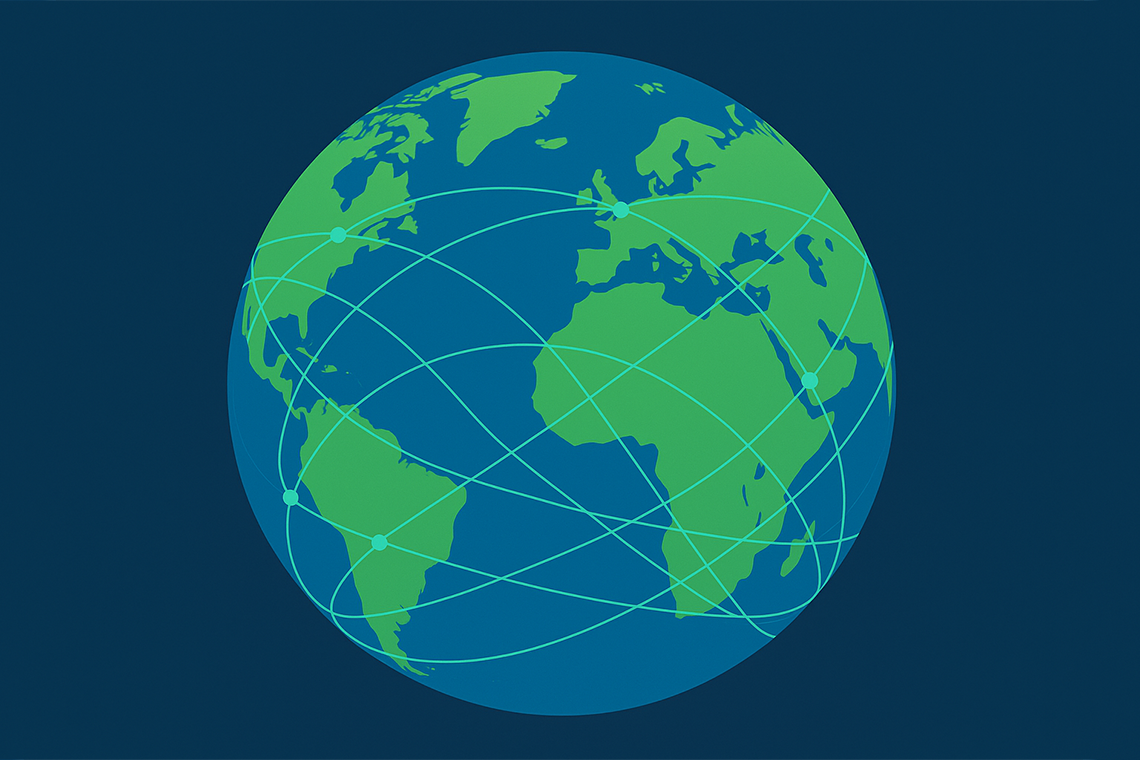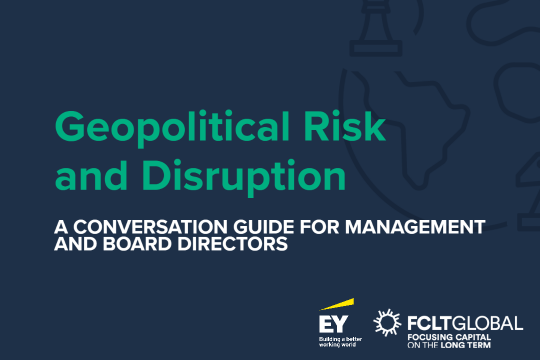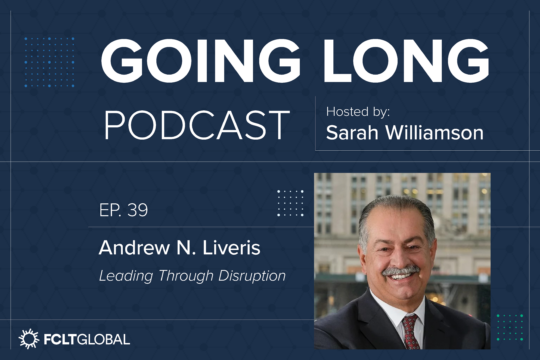Even the most experienced investors must navigate political uncertainty while building portfolios and organizations designed to withstand it. The central dilemma for every investor is no longer whether geopolitics matters, but whether investors are equipped to treat it as a structural driver of long-term performance.
Which is worse: missing a major disruption that creates a new long-term equilibrium, or overreacting to a temporary event that soon reverts to prior conditions? Long-term investors dislike feeling exposed, underprepared, or unaware of potential risks. Fortunately, there are steps they can take to prepare their organizations for geopolitical turbulence.
- Embrace geopolitical change, before it forces your hand
- Talk openly about where you’re most exposed
- Be an active part of the geopolitical future
These actions demand that investors embrace change early, measure and discuss it openly, and actively engage with stakeholders to shape the geopolitical landscape.
Storm Clouds & Silver Linings: Long-term Investing in an Age of Geopolitical Uncertainty outlined how investors can structure their approach to geopolitical risk and made the case that the global economy is entering a new era of power and financial realignment. Our recent discussions with leading asset owners and corporates have made one thing clear: structure alone is not enough to navigate the major shifts that may reshape the global investment environment for years to come.
The true measure of readiness is whether investors can act with clarity and conviction when events move faster than forecasts. Success does not depend on predicting a disruption precisely as it unfolds, but on having the processes in place to react and adapt effectively.
The tools in Storm Clouds & Silver Linings provide a foundation for investment committees to act now to manage geopolitical risks that threaten portfolios, reputations, and organizational stability. The three imperatives that follow build on this foundation and outline how investors can take a proactive approach, particularly amid tariff and trade-related turbulence.
1. Embrace geopolitical change, before it forces your hand
Geopolitical change is not only a source of volatility; it is a source of long-term opportunity for investors who see it early. Treating geopolitics as a market driver rather than short-term noise allows investors to position ahead of the cycle. Acting early helps capture new growth corridors, diversify investments, and align portfolios with emerging industries and policies. For example, huge investments pouring into AI can be analyzed using a geopolitical lens: many governments view AI investment as a strategic and competitive imperative, which ultimately can shape how alliances are formed. Geopolitics touches many major investment themes such as demographics, climate change, technology, and innovation. Savvy investors integrate geopolitics across scenarios, considering both short- and long-term implications.
Beyond the strategic implications of geopolitics, investors can also set policies and protocols to follow in times of crisis. Investment committees and boards can define “red line” issues before critical events occur. Because geopolitical risk is constantly present, with daily headlines grabbing attention, investment committees can become overly risk-averse or cautious as a result. Some may worry that setting limits reduces flexibility, but clear boundaries prevent panic and moral compromise when conditions deteriorate. Investors who define in advance which markets, counterparties, or regimes fall outside their tolerance can respond with clarity when events move quickly.
Recommendations:
- Underwrite core holdings and strategy using a geopolitical lens regularly.
- Identify where return assumptions rely on outdated expectations about global integration or political stability.
- Define in advance what levels of risk, concentration, or alignment are unacceptable, and be ready to act when those thresholds are crossed.
- Align these decisions with the investment mandate, which is designed to deliver returns over time, not to be invested everywhere at all times. Setting clear parameters strengthens the mandate by protecting long-term value rather than limiting it.
- Plan exit strategies early, particularly in less liquid markets. Some investors may choose to limit private-market exposure in higher-risk jurisdictions while maintaining flexibility through public market positions.
- Rebalance capital gradually toward regions and sectors that are likely to benefit from strategic realignment.
2. Talk openly about where you’re most exposed
Many investors already include a “geopolitical snapshot” in portfolio reviews or risk reports. Listing the top markets, counterparties, or regulatory systems that are most material to performance creates clarity about where risk truly sits and where the portfolio is most concentrated. Rather than a long list of potential risks, focus on the most important three, and explain how a geopolitical event might impact performance.
Investors likely wish to remain agnostic on major political and geopolitical issues, but it’s getting increasingly difficult to manage reputation risk while walking that line. Especially for large national pension funds or sovereign wealth funds, public opinion matters to these investors. Transparency builds alignment across the investment organization. It helps committees and leadership focus on the exposures that could shape long-term results. Some investors hesitate to share this information, worrying that openness could invite scrutiny or politicize decisions. Yet keeping it hidden carries greater risk. When stakeholders discover vulnerabilities only after a shock, trust erodes. Open discussion allows investors to manage exposure deliberately rather than defensively.
Recommendations:
- Add a concise geopolitical exposure summary to regular portfolio reviews.
- Highlight where returns rely on policy regimes, trade flows, or specific markets.
- Track these dependencies over time using consistent measures such as liquidity exposure.
Transparency ensures that geopolitical risk is analyzed, debated, and owned, and not swept under the rug. The objective is not just greater transparency, but also to educate stakeholders about key investment risks, focusing on the factual and leaving opinions aside.
3. Be an active part of the geopolitical future
Long-term investors cannot sit on the sidelines while the global order evolves. They have the scale, stability, and credibility to shape the environment in which they invest. Engaging early with companies, policymakers, and peers helps transform geopolitics from an external risk into a long-term opportunity.
Investors control the patient capital that governments and corporations depend on to fund transition, infrastructure, and innovation. Some may view engagement as “mission creep,” and they are right to be cautious. The goal of engagement is not to enter political debates but to protect the conditions that allow investment to thrive. When political situations become inconsistent with those conditions, investors can vote with their feet. Active, pragmatic engagement helps safeguard both market stability and long-term returns.
Recommendations:
- Engage directly with portfolio companies on their exposure to geopolitical change, including supply-chain resilience, market access, and regulatory adaptation.
- Participate in industry and investor forums that promote predictable, transparent markets and reliable investment rules.
- Maintain dialogue with policymakers to understand direction, while avoiding advocacy on political outcomes.
Engagement, when focused on the protection of capital and market function, helps ensure that the future investment landscape remains open, stable, and investable.
From reacting to shaping
Geopolitical awareness is not only a competitive advantage but a prerequisite for long-term performance. Investors who build it into their mandate, processes, and decision-making will define the next era of long-term investing: one shaped by preparation, conviction, and purpose rather than reaction and surprise. Investors who embrace change early will lead the transition to a more resilient global investment value chain.



